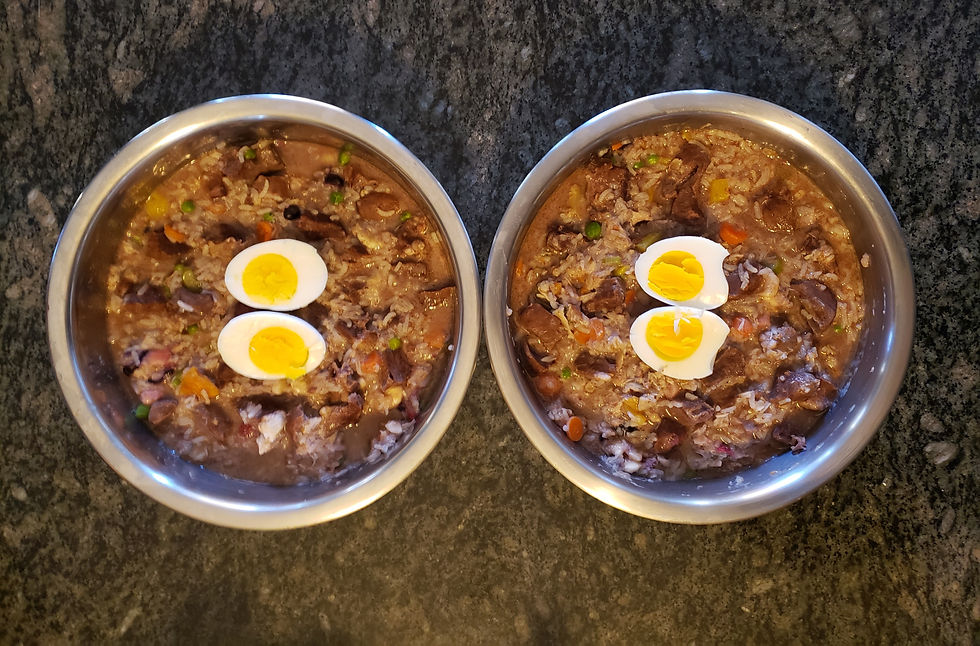Essential Nutrition Guide for Dog Owners
- Joseph Wharram

- Jul 23, 2025
- 3 min read
Updated: Aug 7, 2025
As a dog owner, you want the best for your furry friend. Nutrition plays a crucial role in their health and happiness. Just like humans, dogs need a balanced diet to thrive. This guide will help you understand the essentials of dog nutrition, ensuring your beloved companion gets the right food for their needs.
Understanding Pet Nutrition Basics
Pet nutrition is not just about filling a bowl with food. It involves understanding what your dog needs to stay healthy. Different dogs have different dietary requirements based on their species, age, size, and activity level.
Key Nutrients for Pets
Proteins: Essential for growth and repair. Proteins are made up of amino acids, which are vital for your pet's body. Note the best proteins contain at least seven if not all nine essential amino acids.
Fats: Provide energy and support cell function. Healthy fats, such as omega-3 and omega-6 fatty acids, are important for a shiny coat and healthy skin.
Carbohydrates: While not essential, they provide energy and help with digestion. Whole grains, fruits, and vegetables can be good sources of carbohydrates.
Vitamins and Minerals: These are crucial for various bodily functions. Vitamins A, D, E, and K, along with minerals like calcium and phosphorus, support overall health. Natural sources are essential as laboratory / chemically produced options are not recommended
Water: Often overlooked, water is vital for life. Ensure your pet has access to fresh water at all times.
Choosing the Right Food
When selecting food for your pet, consider the following:
Life Stage: Puppies and kittens require different nutrients than adult or senior pets. Choose food that is appropriate for their age.
Size and Breed: Larger breeds may need different nutrients compared to smaller breeds. Look for food tailored to your pet's size.
Health Conditions: If your pet has specific health issues, consult your veterinarian for dietary recommendations.
Reading Dog Food Labels
Understanding pet food labels can be tricky. Here are some tips to help you decode them:
Ingredients List: Ingredients are listed in order of weight. Look for high-quality protein sources at the top.
Guaranteed Analysis: This section shows the minimum and maximum percentages of nutrients. Ensure it meets your pet's needs.
Feeding Guidelines: Follow the recommended serving sizes based on your pet's weight and activity level.
Homemade vs. Commercial Dog Food
"What's in Your Dog's Food" reviews all types of dog food diets clarifying the :Pros" and "Cons". Many pet owners wonder whether to feed their pets homemade meals or commercial food. For longevity homemade represents the optimal solution.
Special Dietary Needs
Some dogs have special dietary needs due to health conditions or allergies. Here are a few common issues:
Food Allergies: Some pets may be allergic to certain proteins or grains. If you notice symptoms like itching or digestive issues, consult your vet.
Weight Management: Obesity is a common problem in pets. If your pet is overweight, consider a weight management diet and increase their activity level.
Senior Pets: Older pets may require diets lower in calories but higher in fiber to support digestion.
That said all these important issues can be addressed with a well planned , calculated and balanced diet
Treats and Snacks
Treats can be a great way to bond with your pet, but they should be given in moderation. Here are some tips for choosing healthy treats:
Natural Options: Look for treats made from whole ingredients, like fruits and vegetables. Ensure that they do not contain preservatives and other undesirable ingredients. If in doubt consult The International Glossary of Ingredients.
Portion Control: Treats should not make up more than 10% of your pet's daily caloric intake.
Homemade Treats: Consider making your own treats using pet-safe ingredients. This way, you know exactly what your pet is eating.
The Importance of Regular Vet Check-ups
Regular veterinary visits are essential for monitoring your pet's health and nutrition. Your vet can advise and /or provide personalized dietary recommendations based on your dog's specific needs. They can also help identify any potential health issues early on.
Conclusion: A Happy, Healthy Dog Starts with Nutrition
Feeding your pet the right diet is one of the best things you can do for their health and happiness. By understanding their nutritional needs and making informed choices, you can ensure your furry friend lives a long, healthy life. Remember, a balanced diet, regular vet check-ups, and plenty of love and attention are the keys to a happy pet.





Comments